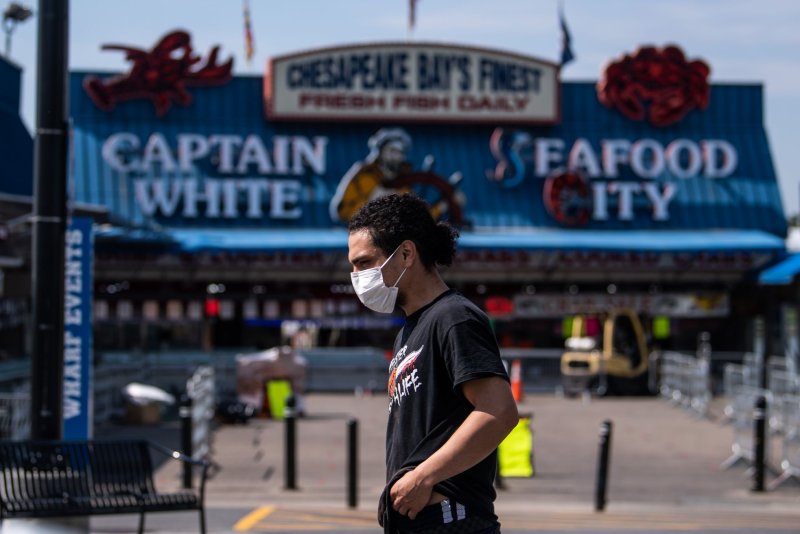A worker wearing a mask walks through the recently closed D.C. Fish Market at the Wharf in Washington, D.C. on Tuesday. Photo by Kevin Dietsch/UPI |
License Photo
April 9 (UPI) -- Researchers this week began experimenting with use of a tuberculosis vaccine in the fight against COVID-19, the disease caused by the new coronavirus, but a viable shot is still likely months away, experts said.
Trials of the vaccine, called Bacillus Calmette-Guérin, or BCG, are now underway in the Netherlands and Australia, with additional studies set to start in Africa in the coming weeks. The vaccine has been in use since the early 1920s, and it has long been part of the World Health Organization's list of essential medicines.
"Vaccines are game-changers in terms of disease transmission," Paul Biddinger, director of emergency preparedness research, evaluation & practice at Harvard T.H. Chan School of Public Health, said during a conference call with reporters on Thursday. "Unfortunately, it's hard to predict whether and when there might be an effective vaccine, but if there is one, and it can be produced on a large scale, it will have a huge impact."
Indeed, "large-scale production" may in fact be the key with BCG. Although the vaccine has been in use for nearly a century -- against diseases like leprosy -- it is still desperately needed to address tuberculosis, or TB, in much of the world.
Roughly 10 million people are infected with TB annually, and some 1.5 million people die from it each year, according to the WHO. The vast majority of these infections are reported in countries in Africa and southeast Asia.
Fewer than 10,000 cases a year of TB are reported in the United States, and most of these result from travel, the Centers for Disease Control and Prevention reports.
Although BCG is largely effective -- research suggests it prevents TB in up to 60 percent of children who receive it -- it may require multiple doses to work, which further stretches supplies.
In recent years, multiple countries in Africa -- where it is widely used -- have reported shortages in stockpiles of the shot.
However, many of these supply issues may be due to the fact it is typically sold at low prices -- less than $1 per dose in much of the world, but up to 200 times that in the United States. This gives manufacturers little incentive to produce it in large quantities, experts said. U.S. stockpiles remain high, though, despite reports of some people hoarding the vaccine in the early days of the outbreak.
Researchers working in Africa have suggested that BCG -- which contains a weakened strain of Mycobacterium bovis, a cousin of Mycobacterium tuberculosis, which causes TB -- may also increase the ability of the immune system to fight off other viruses.
Researchers in the Netherlands have started recruiting 1,000 healthcare workers, who are at high risk for COVID-19, in eight hospitals who will receive either the BCG vaccine or a placebo.
Another team at the University of Melbourne in Australia is in the process of putting together a study with a similar design, while researchers at the University of Exeter in England will be experimenting with the vaccine in elderly people, who are at higher risk for severe disease with COVID-19.
Dr. Caitlin Rivers, of the Center for Health Security at the Johns Hopkins Bloomberg School of Public Health, didn't comment on the potential of the TB vaccine specifically during a conference call with reporters Thursday, but she did note that these and other studies are "likely many months away" from producing concrete results.
"And once there is a vaccine, it still needs to be decided on how it will be distributed and who receives it first," she said.















